- Home
- E. F. Benson
Night Terrors Page 3
Night Terrors Read online
Page 3
My awaking was equally instantaneous, and I sat bolt upright in bed under the impression that some bright light had been flashed in my face, though it was now absolutely pitch dark. I knew exactly where I was, in the room which I had dreaded in dreams, but no horror that I ever felt when asleep approached the fear that now invaded and froze my brain. Immediately after a peal of thunder crackled just above the house, but the probability that it was only a flash of lightning which awoke me gave no reassurance to my galloping heart. Something I knew was in the room with me, and instinctively I put out my right hand, which was nearest the wall, to keep it away. And my hand touched the edge of a picture-frame hanging close to me.
I sprang out of bed, upsetting the small table that stood by it, and I heard my watch, candle, and matches clatter onto the floor. But for the moment there was no need of light, for a blinding flash leaped out of the clouds, and showed me that by my bed again hung the picture of Mrs Stone. And instantly the room went into blackness again. But in that flash I saw another thing also, namely a figure that leaned over the end of my bed, watching me. It was dressed in some close-clinging white garment, spotted and stained with mold, and the face was that of the portrait.
Overhead the thunder cracked and roared, and when it ceased and the deathly stillness succeeded, I heard the rustle of movement coming nearer me, and, more horrible yet, perceived an odour of corruption and decay. And then a hand was laid on the side of my neck, and close beside my ear I heard quick-taken, eager breathing. Yet I knew that this thing, though it could be perceived by touch, by smell, by eye and by ear, was still not of this earth, but something that had passed out of the body and had power to make itself manifest. Then a voice, already familiar to me, spoke.
‘I knew you would come to the room in the tower,’ it said. ‘I have been long waiting for you. At last you have come. Tonight I shall feast; before long we will feast together.’
And the quick breathing came closer to me; I could feel it on my neck.
At that the terror, which I think had paralyzed me for the moment, gave way to the wild instinct of self-preservation. I hit wildly with both arms, kicking out at the same moment, and heard a little animal-squeal, and something soft dropped with a thud beside me. I took a couple of steps forward, nearly tripping up over whatever it was that lay there, and by the merest good-luck found the handle of the door. In another second I ran out on the landing, and had banged the door behind me. Almost at the same moment I heard a door open somewhere below, and John Clinton, candle in hand, came running upstairs.
‘What is it?’ he said. ‘I sleep just below you, and heard a noise as if – Good heavens, there’s blood on your shoulder.’
I stood there, so he told me afterwards, swaying from side to side, white as a sheet, with the mark on my shoulder as if a hand covered with blood had been laid there.
‘It’s in there,’ I said, pointing. ‘She, you know. The portrait is in there, too, hanging up on the place we took it from.’
At that he laughed.
‘My dear fellow, this is mere nightmare,’ he said.
He pushed by me, and opened the door, I standing there simply inert with terror, unable to stop him, unable to move.
‘Phew! What an awful smell,’ he said.
Then there was silence; he had passed out of my sight behind the open door. Next moment he came out again, as white as myself, and instantly shut it.
‘Yes, the portrait’s there,’ he said, ‘and on the floor is a thing – a thing spotted with earth, like what they bury people in. Come away, quick, come away.’
How I got downstairs I hardly know. An awful shuddering and nausea of the spirit rather than of the flesh had seized me, and more than once he had to place my feet upon the steps, while every now and then he cast glances of terror and apprehension up the stairs. But in time we came to his dressing-room on the floor below, and there I told him what I have here described.
The sequel can be made short; indeed, some of my readers have perhaps already guessed what it was, if they remember that inexplicable affair of the churchyard at West Fawley, some eight years ago, where an attempt was made three times to bury the body of a certain woman who had committed suicide. On each occasion the coffin was found in the course of a few days again protruding from the ground. After the third attempt, in order that the thing should not be talked about, the body was buried elsewhere in unconsecrated ground. Where it was buried was just outside the iron gate of the garden belonging to the house where this woman had lived. She had committed suicide in a room at the top of the tower in that house. Her name was Julia Stone.
Subsequently the body was again secretly dug up, and the coffin was found to be full of blood.
The Dust-Cloud
The big French windows were open on to the lawn, and, dinner being over, two or three of the party who were staying for the week at the end of August with the Combe-Martins had strolled out on to the terrace to look at the sea, over which the moon, large and low, was just rising and tracing a path of pale gold from horizon to shore, while others, less lunar of inclination, had gone in search of bridge or billiards. Coffee had come round immediately after dessert, and the end of dinner, according to the delectable custom of the house, was as informal as the end of breakfast. Everyone, that is to say, remained or went away, smoked, drank port or abstained, according to his personal tastes. Thus, on this particular evening it so happened that Harry Combe-Martin and I were very soon left alone in the dining-room, because we were talking unmitigated motor ‘shop’, and the rest of the party (small wonder) were bored with it, and had left us. The shop was home-shop, so to speak, for it was almost entirely concerned with the manifold perfections of the new six-cylinder Napier which my host in a moment of extravagance, which he did not in the least regret, had just purchased; in which, too, he proposed to take me over to lunch at a friend’s house near Hunstanton on the following day. He observed with legitimate pride that an early start would not be necessary, as the distance was only eighty miles and there were no police traps.
‘Queer things these big motors are,’ he said, relapsing into generalities as we rose to go. ‘Often I can scarcely believe that my new car is merely a machine. It seems to me to possess an independent life of its own. It is really much more like a thoroughbred with a wonderfully fine mouth.’
‘And the moods of a thoroughbred?’ I asked.
‘No; it’s got an excellent temper, I’m glad to say. It doesn’t mind being checked, or even stopped, when it’s going its best. Some of these big cars can’t stand that. They get sulky – I assure you it is literally true – if they are checked too often.’
He paused on his way to ring the bell. ‘Guy Elphinstone’s car, for instance,’ he said: ‘it was a bad-tempered brute, a violent, vicious beast of a car.’
‘What make?’ I asked.
‘Twenty-five horse-power Amédée. They are a fretful strain of car; too thin, not enough bone – and bone is very good for the nerves. The brute liked running over a chicken or a rabbit, though perhaps it was less the car’s ill-temper than Guy’s, poor chap. Well, he paid for it – he paid to the uttermost farthing. Did you know him?’
‘No; but surely I have heard the name. Ah, yes, he ran over a child, did he not?’
‘Yes,’ said Harry, ‘and then smashed up against his own park gates.’
‘Killed, wasn’t he?’
‘Oh, yes, killed instantly, and the car just a heap of splinters. There’s an old story about it, I’m told, in the village: rather in your line.’
‘Ghosts?’ I asked.
‘Yes, the ghost of his motor-car. Seems almost too up-to-date, doesn’t it?’
‘And what’s the story?’ I demanded.
‘Why, just this. His place was outside the village of Bircham, ten miles out from Norwich; and there’s a long straight bit of road there – that’s
where he ran over the child – and a couple of hundred yards further on, a rather awkward turn into the park gates. Well, a month or two ago, soon after the accident, one old gaffer in the village swore he had seen a motor there coming full tilt along the road, but without a sound, and it disappeared at the lodge gates of the park, which were shut. Soon after another said he had heard a motor whirl by him at the same place, followed by a hideous scream, but he saw nothing.’
‘The scream is rather horrible,’ said I.
‘Ah, I see what you mean! I only thought of his syren. Guy had a syren on his exhaust, same as I have. His had a dreadful frightened sort of wail, and always made me feel creepy.’
‘And is that all the story?’ I asked: ‘that one old man thought he saw a noiseless motor, and another thought he heard an invisible one?’
Harry flicked the ash off his cigarette into the grate. ‘Oh dear no!’ he said. ‘Half a dozen of them have seen something or heard something. It is quite a heavily authenticated yarn.’
‘Yes, and talked over and edited in the public-house,’ I said.
‘Well, not a man of them will go there after dark. Also the lodge-keeper gave notice a week or two after the accident. He said he was always hearing a motor stop and hoot outside the lodge, and he was kept running out at all hours of the night to see what it was.’
‘And what was it?’
‘It wasn’t anything. Simply nothing there. He thought it rather uncanny, anyhow, and threw up a good post. Besides, his wife was always hearing a child scream, and while her man toddled out to the gate she would go and see whether the kids were all right. And the kids themselves – ’
‘Ah, what of them?’ I asked.
‘They kept coming to their mother, asking who the little girl was who walked up and down the road and would not speak to them or play with them.’
‘It’s a many-sided story,’ I said. ‘All the witnesses seem to have heard and seen different things.’
‘Yes, that is just what to my mind makes the yarn so good,’ he said. ‘Personally I don’t take much stock in spooks at all. But given that there are such things as spooks, and given that the death of the child and the death of Guy have caused spooks to play about there, it seems to me a very good point that different people should be aware of different phenomena. One hears the car, another sees it, one hears the child scream, another sees the child. How does that strike you?’
This, I am bound to say, was a new view to me, and the more I thought about it the more reasonable it appeared. For the vast majority of mankind have all those occult senses by which is perceived the spiritual world (which, I hold, is thick and populous around us), sealed up, as it were; in other words, the majority of mankind never hear or see a ghost at all. Is it not, then, very probable that of the remainder – those, in fact, to whom occult experiences have happened or can happen – few should have every sense unsealed, but that some should have the unsealed ear, others the unsealed eye – that some should be clairaudient, others clairvoyant?
‘Yes, it strikes me as reasonable,’ I said. ‘Can’t you take me over there?’
‘Certainly! If you will stop till Friday I’ll take you over on Thursday. The others all go that day, so that we can get there after dark.’
I shook my head. ‘I can’t stop till Friday, I’m afraid,’ I said. ‘I must leave on Thursday. But how about tomorrow? Can’t we take it on the way to or from Hunstanton?’
‘No; it’s thirty miles out of our way. Besides, to be at Bircham after dark means that we shouldn’t get back here till midnight. And as host to my guests – ’
‘Ah! things are only heard and seen after dark, are they?’ I asked. ‘That makes it so much less interesting. It is like a séance where all lights are put out.’
‘Well, the accident happened at night,’ he said. ‘I don’t know the rules, but that may have some bearing on it, I should think.’
I had one question more in the back of my mind, but I did not like to ask it. At least, I wanted information on this subject without appearing to ask for it.
‘Neither do I know the rules of motors,’ I said; ‘and I don’t understand you when you say that Guy Elphinstone’s machine was an irritable, cross-grained brute, that liked running over chickens and rabbits. But I think you subsequently said that the irritability may have been the irritability of its owner. Did he mind being checked?’
‘It made him blind-mad if it happened often,’ said Harry.’I shall never forget a drive I had with him once: there were hay-carts and perambulators every hundred yards. It was perfectly ghastly; it was like being with a madman. And when we got inside his gate, his dog came running out to meet him. He did not go an inch out of his course: it was worse than that – he went for it, just grinding his teeth with rage. I never drove with him again.’
He stopped a moment, guessing what might be in my mind. ‘I say, you mustn’t think – you mustn’t think – ’ he began.
‘No, of course not,’ said I.
Harry Combe-Martin’s house stood close to the weather-eaten, sandy cliffs of the Suffolk shore, which are being incessantly gnawed away by the hunger of the insatiable sea. Fathoms deep below it, and now many hundred yards out, lies what was once the second port in England; but now of the ancient town of Dunwich, and of its seven great churches, nothing remains but one, and that ruinous and already half destroyed by the falling cliff and the encroachments of the sea. Foot by foot, it too is disappearing, and of the graveyard which surrounded it more than half is gone, so that from the face of the sandy cliff on which it stands there stick out like straws in glass, as Dante says, the bones of those who were once committed there to the kindly and stable earth.
Whether it was the remembrance of this rather grim spectacle as I had seen it that afternoon, or whether Harry’s story had caused some trouble in my brain, or whether it was merely that the keen bracing air of this place, to one who had just come from the sleepy languor of the Norfolk Broads, kept me sleepless, I do not know; but, anyhow, the moment I put out my light that night and got into bed, I felt that all the footlights and gas-jets in the internal theatre of my mind sprang into flame, and that I was very vividly and alertly awake. It was in vain that I counted a hundred forwards and a hundred backwards, that I pictured to myself a flock of visionary sheep coming singly through a gap in an imaginary hedge, and tried to number their monotonous and uniform countenances, that I played noughts and crosses with myself, that I marked out scores of double lawn-tennis courts, – for with each repetition of these supposedly soporific exercises I only became more intensely wakeful. It was not in remote hope of sleep that I continued to repeat these weary performances long after their inefficacy was proved to the hilt, but because I was strangely unwilling in this timeless hour of the night to think about those protruding relics of humanity; also I quite distinctly did not desire to think about that subject with regard to which I had, a few hours ago, promised Harry that I would not make it the subject of reflection. For these reasons I continued during the black hours to practise these narcotic exercises of the mind, knowing well that if I paused on the tedious treadmill my thoughts, like some released spring, would fly back to rather gruesome subjects. I kept my mind, in fact, talking loud to itself, so that it should not hear what other voices were saying.
Then by degrees these absurd mental occupations became impossible; my mind simply refused to occupy itself with them any longer; and next moment I was thinking intently and eagerly, not about the bones protruding from the gnawed section of sandcliff, but about the subject I had said I would not dwell upon. And like a flash it came upon me why Harry had bidden me not think about it. Surely in order that I should not come to the same conclusion as he had come to.
Now the whole question of ‘haunt’ – haunted spots, haunted houses, and so forth – has always seemed to me to be utterly unsolved, and to be neither proved nor disprove
d to a satisfactory degree. From the earliest times, certainly from the earliest known Egyptian records, there has been a belief that the scene of a crime is often revisited, sometimes by the spirit of him who has committed it – seeking rest, we must suppose, and finding none; sometimes, and more inexplicably, by the spirit of his victim, crying perhaps, like the blood of Abel, for vengeance. And though the stories of these village gossips in the alehouse about noiseless visions and invisible noises were all as yet unsifted and unreliable, yet I could not help wondering if they (such as they were) pointed to something authentic and to be classed under this head of appearances. But more striking than the yarns of the gaffers seemed to me the questions of the lodge-keeper’s children. How should children have imagined the figure of a child that would not speak to them or play with them? Perhaps it was a real child, a sulky child. Yes – perhaps. But perhaps not. Then after this preliminary skirmish I found myself settling down to the question that I had said I would not think about; in other words, the possible origin of these phenomena interested me more than the phenomena themselves. For what exactly had Guy Elphinstone, that savage driver, done? Had or had not the death of the child been entirely an accident, a thing (given he drove a motor at all) outside his own control? Or had he, irritated beyond endurance at the checks and delays of the day, not pulled up when it was just possible he might have, but had run over the child as he would have run over a rabbit or a hen, or even his own dog? And what, in any case, poor wretched brute, must have been his thoughts in that terrible instant that intervened between the child’s death and his own, when a moment later he smashed into the closed gates of his own lodge? Was remorse his – bitter, despairing contrition? That could hardly have been so; or else surely, knowing only for certain that he had knocked a child down, he would have stopped; he would have done his best, whatever that might be, to repair the irreparable harm. But he had not stopped: he had gone on, it seemed, at full speed, for on the collision the car had been smashed into matchwood and steel shavings. Again, with double force, had this dreadful thing been a complete accident, he would have stopped. So then – most terrible question of all – had he, after making murder, rushed on to what proved to be his own death, filled with some hellish glee at what he had done? Indeed, as in the church-yard on the cliff, bones of the buried stuck starkly out into the night.

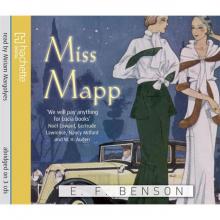 Miss Mapp
Miss Mapp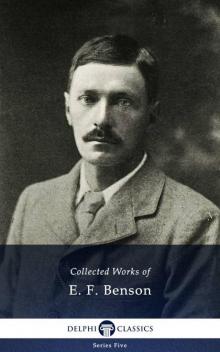 Works of E F Benson
Works of E F Benson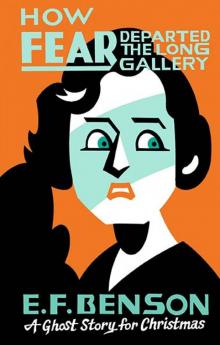 How Fear Departed the Long Gallery
How Fear Departed the Long Gallery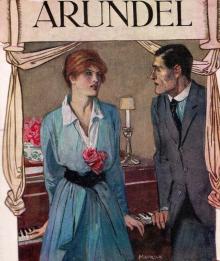 Dodo's Daughter: A Sequel to Dodo
Dodo's Daughter: A Sequel to Dodo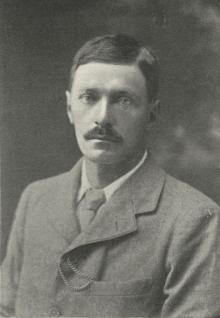 The House of Defence v. 1
The House of Defence v. 1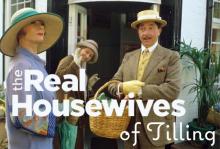 Queen Lucia
Queen Lucia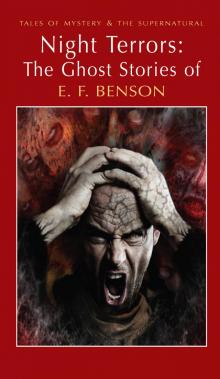 Night Terrors
Night Terrors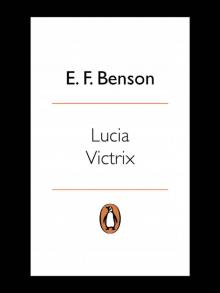 Lucia Victrix
Lucia Victrix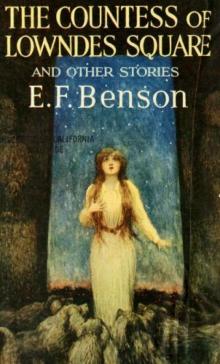 The Countess of Lowndes Square and Other Stories
The Countess of Lowndes Square and Other Stories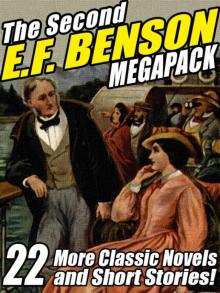 The Second E. F. Benson Megapack
The Second E. F. Benson Megapack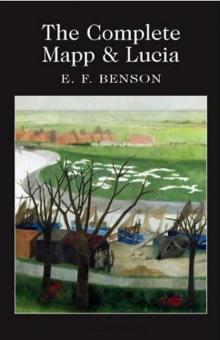 The Complete Mapp & Lucia
The Complete Mapp & Lucia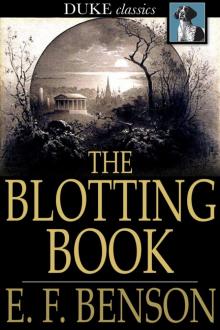 The Blotting Book
The Blotting Book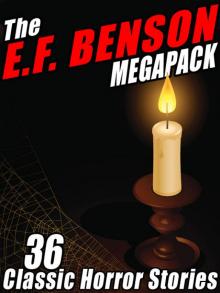 The E. F. Benson Megapack
The E. F. Benson Megapack Lucia Rising
Lucia Rising Ghost Stories
Ghost Stories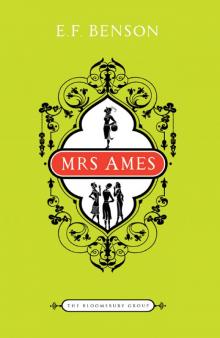 Mrs. Ames
Mrs. Ames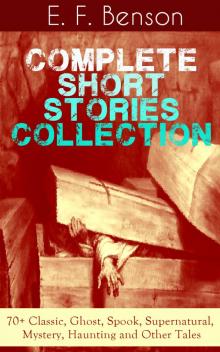 E. F. Benson
E. F. Benson